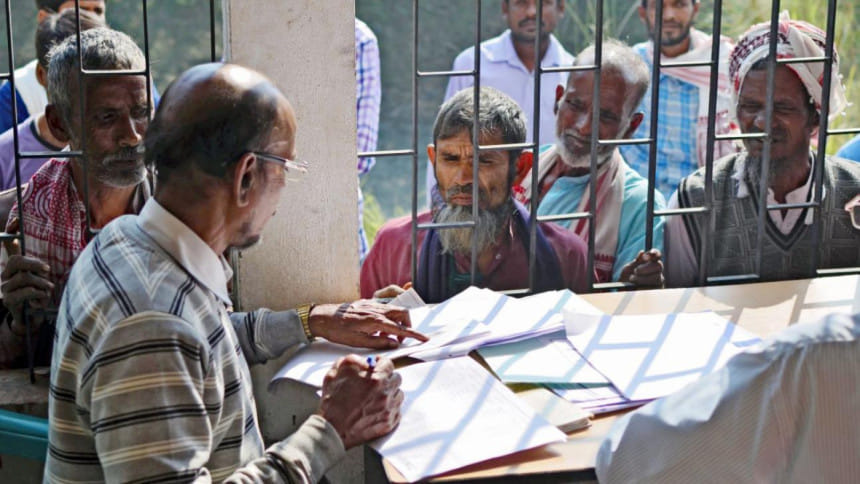An expression of concern?

The cancellations of Foreign Minister Abdul Momen and Home Minister Asaduzzaman Khan’s visits to India amid protests against the Citizenship Amendment Act could be seen as the first sign of rough edges in the bilateral relations over the contentious law.
The cancellations came amidst widespread protests in Assam and Meghalaya against the Citizenship (Amendment) Act, 2019.
While Momen was to attend the sixth Indian Ocean Dialogue, a flagship multilateral event organised by the Indian external affairs ministry, Asaduzzaman was expected to attend an event in Shillong to pay tribute to the freedom fighters of Bangladesh who had been in the camps there in 1971.
Meghalaya Chief Minister Conrad Sangma had invited Asaduzzaman to visit the places where the latter stayed during the Liberation War.
Besides participating in the Indian Ocean Dialogue, Momen was also expected to hold bilateral talks with his Indian counterpart Subrahmanyam Jaishankar.
Officially, however, both sides sought to play down any suggestion of the cancellations being a setback for the robust ties, which have scaled new heights in the last decade encompassing a range of wide areas, or having any links to the citizenship law or protests against it in the north eastern Indian states.
In fact, Indian foreign ministry spokesperson Raveesh Kumar termed “unwarranted” any attempt to link the cancellation of the visits to the law and said both the countries have said that “this is the ‘sonali adhyay [golden chapter]’ in relations between the two countries”.
But behind the official postures of New Delhi and Dhaka there could be unease caused by the new law and the National Register of Citizens (NRC).
Momen cited “pressing domestic issue” of Victory Day in Dhaka, State Minister Shahriar Alam being in Madrid, and Foreign Secretary Shahidul Haque being in The Hague to attend the ICJ hearings on the Rohingya genocide as reasons for him calling off the Delhi visit.
However, neither Momen’s visit to India nor that of Shahriar and Shahidul was arranged at the eleventh hour. In fact, the Indian foreign ministry had put on its website an advisory on Wednesday about the Bangladesh foreign minister’s visit.
It is understood that by cancelling the visits of Momen and Asaduzzaman, Dhaka indicated its disquiet over the manner in which India went about the Citizenship Amendment Act or the National Register of Citizens.
Dhaka’s apprehensions about the NRC exercise in Assam was conveyed at the highest level when Prime Minister Sheikh Hasina met her Indian counterpart Narendra Modi on the margin of the UN Conference in New York in September.
Modi assured Hasina not only in New York but also in October during their previous bilateral meeting at the Hyderabad House in the Indian capital that the NRC was an internal issue of India and Bangladesh need not worry over it. The same message was conveyed earlier by Jaishankar to Momen during their meeting in Dhaka.
Sources in Dhaka said it was Citizenship Amendment Act more than the NRC that was a cause of concern for Bangladesh.
According to the sources, implementation of the Citizenship Amendment Act brings with it a risk of hardening the public opinion in Bangladesh about India and could pose a challenge to maintain Bangladesh’s image as a moderate Islamic country with a functioning democratic government.
During the October visit to Delhi, Hasina at a meeting urged the South Asian countries to look beyond the “majority-minority mind-set”. Her remarks analysts in India interpreted as her disapproval of the NRC.
Dhaka’s thoughts on the Citizenship Amendment Act reflected in Momen’s exchanges with the ambassadors of the US and Japan in Bangladesh Earl Miller and Ito Naoki on Thursday.
“India is historically a tolerant country which believes in secularism ... their historic position will be weakened if they deviated from that. What India has done is an internal matter of the country. But I hope that friendly India will not do anything that will create a sense of terror among the people of both countries. I will have to read the CAB [Citizenship Amendment Bill],” he is reported to have said.
Dhaka was also reportedly not happy with Indian Home Minister Amit Shah’s repeated reference to alleged minority persecution in Bangladesh.
Momen had responded to Shah’s reference to “atrocities” against the Hindu women in Bangladesh between 2000 and 2003 during a debate on the Citizenship Amendment Bill in the Lok Sabha on Monday and reiterating some of his arguments in the Rajya Sabha two days later.
“There are very few countries where communal harmony is as good as in Bangladesh. If he [Amit Shah] stayed in Bangladesh for a few months, he would see exemplary communal harmony in our country,” Momen said.
The reality is that Amit Shah had stated in the Lok Sabha that the persecution of the Hindus in Bangladesh had taken place during the rule of the BNP and Khaleda Zia whom he had singled out in the Lok Sabha debate.
Shah had also said that “as long as Bangabandhu Sheikh Mujibur Rahman was alive, there was not a single instance of atrocity on the Hindus in Bangladesh. But after his assassination in 1975, the atrocities broke the backbone of the minorities in Bangladesh.”
The Indian home minister also commended the current Bangladesh government for taking care of religious minorities well.
While there is no need to take an alarmist view of the impact the cancellation of the two ministerial visits may or may not have on Delhi-Dhaka ties, the two sides should guard against allowing rough edges to fester.

 For all latest news, follow The Daily Star's Google News channel.
For all latest news, follow The Daily Star's Google News channel. 



Comments